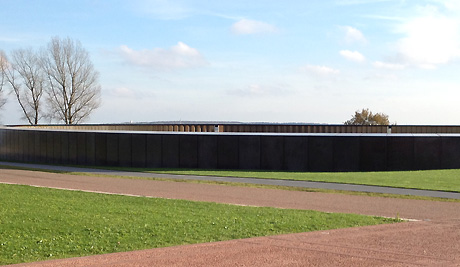I had the great good fortune to participate in two very different ceremonies to commemorate this 11th of November a hundred years after the start of the First World War.
Written version (continued)
First I accompanied the French Defence Minister, Mr Le Drian, to London where he held talks with the British Defence Minister Mr Fallon, at the Tower of London. And so we were able to visit the extraordinary field of poppies around the Tower. It’s fascinating that this started as the initiative of one sculptor artist and suddenly took off in the public imagination, and has become such a symbol of the 880,000 British soldiers who lost their lives in the First World War.
And as we explained to the French Minister, the sculptor wanted this to be a temporary exhibition, and therefore that the poppies have been sold already for the British Legion, and many of them will now be leaving to those who bought them, some staying for a short period.
The Minister was very interested I think to see that this popular excitment for a mark of respect for all those who died has taken such a significance in the UK.
Secondly I was able to participate in the opening of a new monument built by the French authorities near Arras on the Western front, called a “Ring of memory”. It’s an enormous oval of bronze panels, a bit like the opened pages of a book, with the names inscribed of 580,000 soldiers of all nationalities who died in that area in the North of France.
The special quality of this is that the names are listed in alphabetical order. So the first name on the wall is actually a Nepalese soldier, and the last is a German. And among them are 260,000 names of British soldiers who died, including Wilfred Owen, the famous poet.
Both these monuments in a way capture something about the scale of the losses in the First World War, and also that a hundred years on, it’s no longer a question of nationalities, as in who is on what side, but we should commemorate and honour the memories of all who died, while passing onto new generation the message that absolutely this must never happen again.

